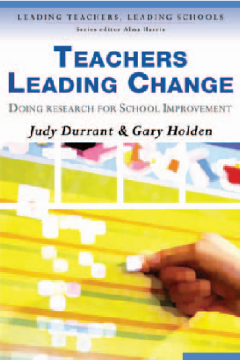
Additional Information
Book Details
Abstract
'Their book will be of interest to teachers who wish to be proactive rather than reactive. It will be important reading for anyone who wishes to undertake school-based research' - Times Educational Supplement. 'This is a book which places teachers at the heart of inquiry for improvement. The realism, experience and optimism of each of the writers, shines through each page of text. It is a 'can-do' book which combines discussion of principles, practices and contexts with practical examples of exercises. Recommended reading for those wishing to reflect upon the challenges and joys of engaging in teacher-led change' - Christopher Day, Professor of Education and Co-Director, Centre for Research on Teacher and School Development, University of Nottingham. This book shows how to support teachers' leadership of school change. Within a theoretical and policy context, the authors: o give practical guidance for integrating inquiry with practice. o show how to encourage collaboration and critical dialogue within and between schools. o focuses strongly on pupil, teacher and organizational learning. The book includes tried-and-tested ideas for aspiring and experienced teacher leaders and researchers.
Table of Contents
| Section Title | Page | Action | Price |
|---|---|---|---|
| Prelims (Boxes, Tables, Figures, Foreword by Nabeel Hamdi) | |||
| 1. Introduction - Building Back Better | |||
| Michal Lyons, Theo Schilderman and Graham Saunders | |||
| Part I: Setting the Scene | |||
| 2. Putting people at the centre of reconstruction | |||
| Theo Schilderman | |||
| 3. Can large-scale participation be peoplecentred? Evaluating reconstruction as development | |||
| Michal Lyons | |||
| 4. The people’s process: The viability of an international approach | |||
| Lalith Lankatilleke | |||
| Part II: Making Programmes Work for People | |||
| 5. Scaling-up people-centred reconstruction: Lessons from Sri Lanka’s post-tsunami owner-driven programme | |||
| Vishaka Hidellage and Aziza Usoof | |||
| 6. Pakistan: Implementing people-centred reconstruction in urban and rural areas | |||
| Usman Qazi | |||
| 7. Indonesia: Understanding agency policy in a national context | |||
| Jo da Silva and Victoria Batchelor | |||
| 8. India: From a culture of housing to a philosophy of reconstruction | |||
| Jennifer Duyne Barenstein and Sushma Iyengar | |||
| Part III: Lessons from the Project Level | |||
| 9. Decentralizing (re)construction: Agriculture cooperatives as a vehicle for reconstruction in Colombia | |||
| Gonzalo Lizarralde | |||
| 10. Kenya: Can temporary shelter contribute to participatory reconstruction? | |||
| Dyfed Aubrey | |||
| 11. Bangladesh: Can large actors overcome the absence of state will? | |||
| Khurshid Alam | |||
| 12. Turkey: Can small actors overcome the absence of state will? | |||
| Hakan Arslan and Cassidy Johnson | |||
| 13. Progressive housing: Reconstruction after the 2001 earthquake in El Salvador | |||
| Carmen Ferrer Calv, Concepcion Herreros and Ing. Tomas Mata | |||
| 14. Peru: The long-term impact of short-term reconstruction work | |||
| Eliseo Guzmán Negrón | |||
| 15. Conclusions | |||
| Michal Lyons, Theo Schilderman, Camillo Boano and Sandra D’Urzo |
